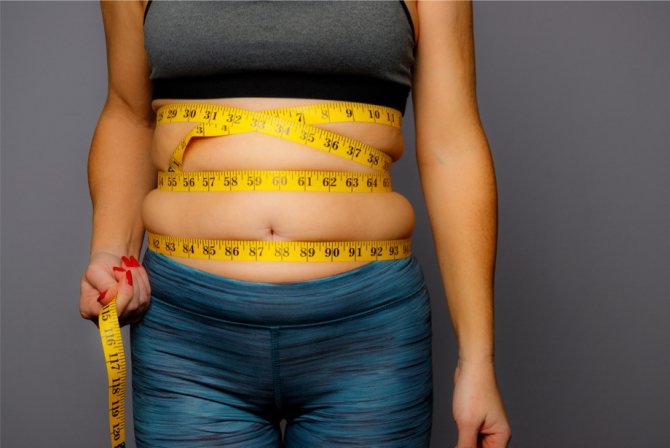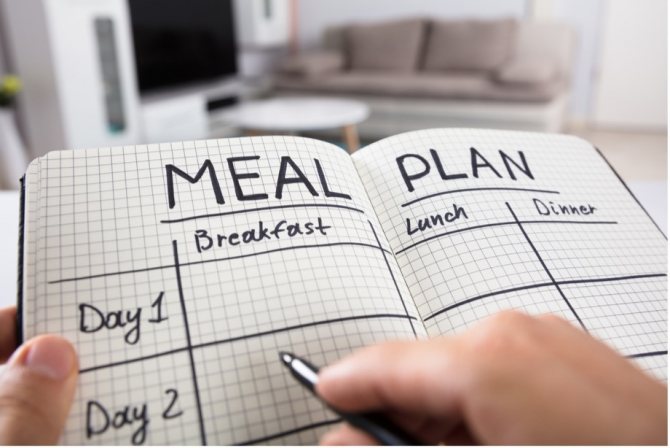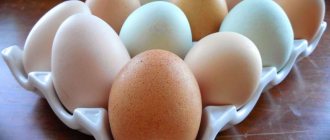Any diet, and even a seemingly easier healthy diet, is often accompanied by disruptions to the diet, overeating or consumption of prohibited foods, which are highly recommended for consumption. Some of them have a negative impact on your figure, nullifying all efforts to choose a diet and maintain a diet, while others can even harm your health during, for example, therapeutic nutrition. Such breakdowns occur for various reasons, but knowing them, it is quite possible to deal with such a problem.
It’s easy to accumulate, but much more difficult to get rid of.
To lose weight, we need to spend more calories than we get from food. It's simple. Everybody knows. But if you look at the sad statistics on the growth of obesity (and even just at people on the street), it becomes obvious that difficulties arise with implementation in practice. Alas, our bodies are designed in such a way that they can easily and naturally increase fat mass at the “unlimited” rate, but when it comes to getting rid of these reserves, problems begin. Our body and our brain do not like to lose weight. And accordingly, they hinder this process in every possible way.
Yes, at first everything goes very smoothly. Let’s say you set yourself a daily limit of 1,700 calories and confidently stick to this plan for a day, two, three, sometimes five or six. But then... And then a breakdown occurs. If you are not a competitive athlete in the fitness category and, in addition, are not very experienced in losing weight, then the question is not “what to do IF this happened?”, but “what to do WHEN this happened?”.

Photo: istockphoto.com
Why do I want to eat so much?
To begin with, here are literally a few examples of how these breakdowns can be provoked. Let's say you lack motivation. This happens all the time, when a person is generally satisfied with his appearance, but he is tormented by his significant other: “We urgently need to lose weight, let’s go on a diet.” Such weight loss for company will end very quickly, as soon as it begins.
Often, an unauthorized trip to the food court of the nearest shopping center is provoked by the lack of visible results. Now you’ve been eating right for a whole week, try not to miss meetings with a personal trainer at the fitness club, and the scales are not showing the proper dynamics. Thoughts naturally creep into my head: “Since I can’t lose weight, it means it’s simply not given to me. So why should I torture myself?!”
When faced with such stories, I like to quote Mike Tyson
: “When things get tough, I always remind myself that if I give up, things won’t get better.” It’s the same with us. Remember why and why you started this whole story. Is this goal still important and meaningful to you? And if so, then you simply have no choice - you need to go to the result. Yes, sometimes weight or waist, or even both indicators may not change for a week or even two. And this does not mean that something is going wrong. Everything is fine, it’s just that the body is also resisting. Metabolic adaptation also occurs. But if you act according to a clear and competent plan, then your chances of winning are 100%. Fat deposits can win local battles (not decrease for a whole week), but they cannot win this war against you. Everything will definitely work out.

Photo: istockphoto.com
Ways to combat physiological causes
The first way to avoid any physiological causes of possible breakdowns and monitor the reaction of the whole body to a new diet is to consult a doctor. Ideally, of course, with a nutritionist, but in the case of normal health and the usual absence of any digestive problems, a consultation with a regular doctor will suffice. It is he who can recommend some ways to systematize nutrition, tell you what to pay attention to first, and prescribe the necessary tests if you suspect any supposed negative consequences.
In addition to consulting a doctor, it is necessary to personally pay attention to your own attitude to nutrition, taking into account certain tips:
- the main recommendation regarding any diet is a large amount of water, which stimulates all body processes, improves metabolism, has a positive effect on food digestion and, which is especially important for the prevention of any breakdowns, helps control appetite;
- during any diet, even the most strict one, one must not forget about any group of products; in the most equal proportions one must consume the same standard proteins with fats, not forgetting about healthy carbohydrates and supplementing this with vitamins and fiber in vegetables and fruits; that is why mono-diets cannot be carried out for too long; their maximum duration is a week;
- Vitamins and healthy food supplements can be an excellent addition to your diet; if they were not in your normal diet, then when significant restrictions are introduced, it’s time to start using healthy products;
- We must not forget about our own needs when setting the total calorie content of foods for the day, choosing the size of portions and the timing of meals; it is better to listen to your own feelings at first and try to adapt to them.
Following such recommendations will keep your body in good shape and help you quickly achieve the desired results in losing weight or improving your health. And the best motivation that encourages you to continue a reasonable diet, and the best prevention from any breakdowns, is the observation of noticeable and attractive results that all this “torture” with losing weight really leads to.
If you go on a visit, you can eat everything. It is impolite to refuse
Another common option for breaking a diet is getting into provocative conditions. Going to a restaurant or visiting. Here we must admit that this is not an apology or justification. We end up in such situations 99% of the time as planned, agree. And if so, then our task is simply to prepare for this event. For example, come to visit not hungry, so that you can look at all the treats with indifference and limit yourself to the minimum set on your plate, devoting most of your time to the main thing - communication. Of course, there is not much point in going to a restaurant with a full stomach, but you can also have a light snack. And it is extremely important to determine your menu in advance. Either look on the establishment’s website to see what dishes are offered, or simply establish that it will be, say, steamed fish and salad. The main thing here is not to find yourself in a situation where you need to make an urgent choice, when a waiter is standing over your shoulder and waiting. In this case, the risk that you will order something you don’t need is very high. Or you can place an order based on the choice of other participants in the feast.
There is no need to punish yourself or, for example, try to “work off” extra calories in the gym.
A bun with cream or an appointment with a psychologist?
In general, there can be a lot of reasons to break your diet. And often this happens not at all because you starved yourself to death. In the vast majority of cases, we are talking about emotional reactions. Stress, joy - from childhood we have formed patterns that this is solved by food. “If you’ve done your homework, here’s some candy” is the simplest example. You need to slowly change your attitude towards food. Food is our fuel. Of course, food is a source of pleasure. But food is not the solution to emotional problems. It's just food. Tasty and healthy. But let’s move from philosophy to practice and analyze the mechanism of breakdowns and what we should do to avoid going astray.
The breakdown mechanism is always approximately the same. In the evening I was stuck at work, then my birthday, I didn’t go to the gym - I didn’t have time, at home watching the TV I also ate too many cabbage pies.
In the morning on the scales (although this should be done once a week and no more often) - and there’s nothing encouraging there either. And the hand itself reaches out into the handle of the refrigerator. So far the thought is: “Well, since everything turned out like this yesterday, then today I’ll arrange a small holiday of disobedience for myself, and tomorrow I’ll pull myself together.” And this is where the trap lies.
Case Western University has developed an excellent relapse scale that clearly illustrates the mechanism.
- The first day
is when you’re stuck at work, it’s a colleague’s birthday, and you have cabbage pies at night. This lapse - according to the Case University scale - is translated into Russian as a blunder, an oversight. Very consonant with our Russian word “blunder”. - Then our second day
- when the thought “since yesterday I had a blast, today I’ll treat myself for a day.”
This is already a relapse
. Translated into Russian - relapse.
Look even phonetically and semantically how exactly it turns out. A blunder is, in general, just an annoying little thing. But a relapse is already serious, it’s scary. What after relapse? Often events develop according to the following pattern. Tomorrow comes, we should go for a walk or, say, go to training, or count how many calories we have for breakfast - but somehow we’re not in the mood again. “Well, let there be another day” - this is a relapse again. And then there are two or three such “relapses”, and what scientists call collapse occurs - that is, everything, collapse. Very quickly you find yourself at point zero, where you started this whole transformation story. Only now with the feeling of a weak-willed loser, fear of starting everything again, because there is a negative experience. Or you will lose faith in the scheme and start looking for magic pills and miracle diets.
Physiological reasons
The main causes of breakdowns, which cannot be overcome by simple persistence and willpower, are precisely physiological reasons. Often the chosen diet is not suitable for the body, not because of some habits that have become established over time, but due to the peculiarities of the functioning of certain organs. Lack of certain groups of substances, general health problems - all this can be caused by the choice of unnecessary products or their incorrect combination.
The main physiological reasons for eating disorders include:
- lack of vitamins of all groups or some specific compounds with complete refusal, for example, from fats or carbohydrates;
- insufficient amount of water consumed, in this case the feeling of thirst may be confused with the feeling of hunger;
- too long breaks between meals, leading to increased hunger;
- too little calorie content of all dishes allowed per day, taking into account the large physical activity during the same day;
- nutritional imbalance causing digestive problems, abdominal pain and other possible disorders.
Such reasons usually only indicate inexperience in choosing a diet and a desire to lose weight as quickly as possible. In the end, such inattention to the signals that the body gives can lead to illness. Then there can be no talk of any proper nutrition; it will be replaced by medicinal nutrition, from which it will be absolutely impossible to break away.
Don't turn weakness into a habit
Therefore, the first and most important rule is - under no circumstances and conditions do you allow yourself to turn a lapse into a relapse! Remember that a blunder is just a blunder, a minor nuisance. And even purely mathematically. Let’s say you ate 1,500 extra calories, even if you imagine that in some way unknown to physiology, each of these extra calories will go into fat, then it will only be less than 170 grams. But in reality this will not happen, of course. We're talking about just a few grams of fat maximum. But provided that this is really a one-time mistake like this over a long and successful distance.
And in the morning the next day or, for example, if a breakdown happened during the day, then that same evening - immediately return to your usual routine! There is no need to punish yourself or, for example, try to “work off” extra calories in the gym. No! All this will not bring results, but will only perpetuate negative perceptions and dissatisfaction with oneself. You just need to literally calmly get out of the situation, exhale, forgive yourself, take your normal steps, and return to your normal caloric intake. No fasting or trying to subtract extra calories from the following days. Was. It's gone. Forgot. Go ahead.

Photo: istockphoto.com
Just analyze what brought this “blunder” to life and develop an algorithm for what you will do in the future if such a scenario happens again.
Another scenario is possible, though. Monday - lapse, Tuesday-Wednesday - mode, Thursday again lapse, then another one on the weekend. But the next day - back in action. This is also a very wrong strategy. There can't be too many mistakes. We are designed in such a way that we learn from our mistakes and draw conclusions. If the number of mistakes tends to equal the number of days in the week, then it becomes obvious that in fact the person is not serious about the result. He's just playing the “fashionable healthy lifestyle” game. Or an initially incorrect or inappropriate scheme was chosen. Including the calculation of the daily norm. And then you just need to think about which approach will work better.
Psychological reasons
Psychological reasons are the first to arise in thoughts when talking about breakdowns. It is the desire for sweets, postponing the diet “for Monday” and other problems that usually become a kind of beginning (and continuation) of poor nutrition, eating unhealthy and high-calorie treats, and then self-flagellation and promises to definitely lose weight from the same “Monday”.

But in fact, psychological reasons demonstrate not only weak will, but also many other parameters determined by the surrounding psychological situation, mood and other problems that lead to overeating, almost forcing one to relapse. So, these reasons include:
- increased fatigue and tiredness, depression and bad mood, which, albeit temporarily, can still be “drown out” by eating sweets;
- misunderstanding on the part of others, failure of loved ones to accept the goal of losing weight, as a result of which mother’s treats, get-togethers with friends and other shared meals turn into an absolute feast that has nothing to do with diet;
- the habit of “chewing” something while watching a movie or reading a book;
- reluctance to stand out from the rest of the crowd, for example, at work or at school, a peculiar need to eat what everyone else eats, even if it is unhealthy fast food;
- the same banal habit of eating unhealthy foods, eating at inappropriate times and overeating at night.











